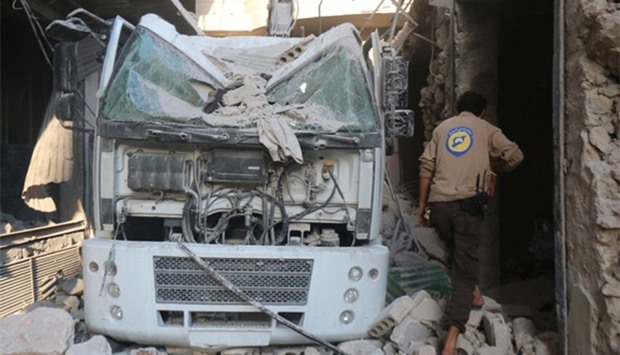Partially agreeing with German Foreign Minister Frank-Walter Steinmeier, Lavrov acknowledged that ‘a pause of three hours per day is insufficient.’ However, he also told reporters that ‘for this to be prolonged, it is necessary to resolve issues in the fight against the terrorists.’ ‘A result of the pause has been a slight improvement of the humanitarian situation,’ Lavrov said in comments carried by Russian state news agency TASS.
‘But the main result has been terrorists replenishing their numbers by 7,000 people, not to mention a large quantity of guns and munitions,’ he said.
Meanwhile, Russian Defence Minister Sergei Shoigu said in comments carried by state news agency RIA Novosti that Russia and the United States are coming closer to joint military action in Aleppo against the terrorist group Islamic State.
‘We are currently in a very active stage of negotiations with our American colleagues,’ Shoigu said. ‘Step by step, we are coming closer to a plan - I'm only talking about Aleppo right now - that will enable us to start fighting together to establish peace in this very troubled land so that people can return to their homes.’ Earlier on Monday, Steinmeier called on Russia to lay down its weapons to allow humanitarian aid to reach the embattled city in northern Syria.
‘I think the weapons must be silent so that people can be supplied with basic necessities,’ Steinmeier said in Yekaterinburg, Russia's fourth-largest city.
‘The humanitarian situation in Aleppo is catastrophic. This cannot and must not continue. Three hours a day is not enough,’ Steinmeier said.
The three-hours-a-day ceasefire seems like a concession, but in fact is not, German government spokesman Steffen Seibert said in Berlin.
It is up to Moscow and the Syrian regime to decide ‘whether the dying continues in Aleppo,’ Seibert said.
Fighting between Syrian government forces and the rebels first broke out in mid-2012 in Aleppo. After regime forces captured the last rebel supply route into the east last month, the UN warned that food supplies there would last only until mid-August.
Russia, a key ally of the Syrian government, last week announced three-hour humanitarian pauses over three days to allow aid into Aleppo. But the UN said the move was inadequate.
Both Steinmeier and Lavrov acknowledged that diplomatic ties between Germany and Russia were currently strained.
‘I am convinced that the relationship will stabilize again sooner or later,’ Lavrov said, adding that Germany was a strategically important partner for Russia.
The countries have clashed repeatedly over Russian involvement in Syria and its role in secessionist fighting in eastern Ukraine.
‘Russian-German relations are currently going through a difficult period,’ Lavrov said.
‘I think this is the most difficult period since Germany's reunification, which occurred with an active and decisive role by our country [the Soviet Union].’ For his part, German Vice Chancellor Sigmar Gabriel said Monday that improving ties with Russia was one of the most important tasks facing the coalition government.
‘We urgently need a better relationship with Russia,’ he said during a visit to the city of Oberhausen.
‘It is not the case by a long shot that we like everything that happens there, especially not the behaviour in Syria. Nonetheless, we know without Russia we will not achieve progress in either Ukraine or Syria,’ Gabriel added.

